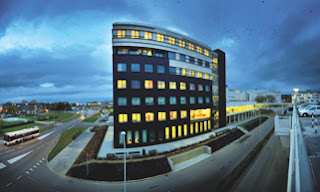by Leigh Spielberg
A large conference is sort of like the Olympic Village that’s always built in the Olympics’ host city.
It contains a collection of like-minded individuals which,when the hotels are included, are separated from the rest of the population, separated from friends and family, essentially separated from the rest of the world.
There are shiny facilities, food & drinks and support staff for the doctors, who are only expected to expend their energies on ophthalmology and nothing else.
People come from all over the world and do so voluntarily. They give their best performance, one for which they have worked long and hard to perfect.
This year’s London multi-conference was quite a bit larger than the 2014 Olympic Village in Sochi. With more than 14,000 delegates attending EURETINA, ESCRS, EUCORNEA, the WSPOS sub-specialty day and ESCRS Glaucoma Day, it was nearly twice as large as Sochi’s village, which was attended by “only” 6,000 athletes.
Fortunately, we as ophthalmologists can continue doing what we do until longafter the current crop of Olympic athletes have retired, so I think we have the better end of this comparison.
Real life
I occasionally find it somewhat tricky to return to “real life” after being away from home for a while, whether I’ve been on vacation or at a conference.
It’s not only the foreign environment, the unusual daily activities and the removal from all that is familiar makes for an occasionally awkward transition back to normalcy.
It is also, and primarily, the total immersion into the world of
ophthalmology that takes a day or two to snap out of.
However, it all pays off when I return to the clinic and begin to apply the things I have learned over the past few days.
Colleagues are interested in hearing about what I heard, new discussions are initiated and vague plans are made to attend
next year, not only to step out of the clinic routine for a few days but to have time to focus on thinking about ophthalmology and learning what others have discovered, rather than simply doing what one already knows.
In my opinion, technological advances have brought about the biggest changes between recent conferences and those of the past.
The ESCRS and EURETINA conference apps made it quite a bit easier this year to navigate the sessions. WhatsApp has made it simple to find colleagues and friends without paying exorbitant roaming fees for text messages.
The vibe at a conference this big is one of great energy. Most of that energy is good: “Great, I’m going to an interesting session. So nice to see you again, when was the last time, three years ago? How is your practice going?”
But some of it is nervous energy: “I’m late! I forgot to plan ahead and now I’m missing all the best sessions! I’m worried about my presentation! I hope they don’t ask me too many difficult questions!”
Ach, sit back, relax and enjoy the show. See you next year!







